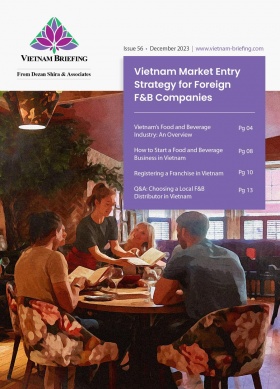The Laboratory Market in Vietnam: Current Trends and Future Prospects
The laboratory market in Vietnam is experiencing significant growth, driven by rising investment, heightened awareness, and increasing demand from various industrial sectors.
The diagnostic labs market was estimated at US$1289.4 million in 2023. Looking forward, the industry is expected to maintain a stable growth trajectory with an anticipated compound annual growth rate (CAGR) of 6.7 percent through 2029.
Growth drivers of the laboratory market in Vietnam
Vietnam’s laboratory market encompasses public, private, and foreign-owned laboratories. Several key industries are driving the development of the laboratory sector in Vietnam:
Pharmaceutical industry
Vietnam’s pharmaceutical industry is on the rise, with the revenue of the market rapidly increasing from US$5.4 billion in 2018 to US$6.5 billion in 2021, along with the emergence of high-skilled and globally competitive jobs.
With the approval of the “National Strategy for Development of Vietnam’s Pharmaceutical Industry to 2030” with a vision to 2045, it is evident that this sector will expand exponentially in the following years.
Domestic pharmaceutical companies are investing heavily in research and development (R&D), quality control, and production capacity, necessitating extensive laboratory services for analysis and quality assurance.
Read: The Future of Vietnam’s Pharmaceutical Industry: Unpacked
Chemicals industry
Vietnam’s chemical industry has experienced consistent growth in recent years, fueled by the country’s industrialization, urbanization, and expanding population. This flourishing industry is expected to reach a market value of US$3.72 billion by 2024, with a projected CAGR of 8.73 percent over the next five years.
The strategic plan of the Vietnamese government towards the development of this industry through 2030 aims for the sector to achieve an average annual growth rate of 10-11 percent through 2030 and contribute about 4-5 percent of Vietnam’s overall industrial output.
This growth in the chemical sector is expected to significantly increase the demand for chemical testing and analysis services within the industry.
Environmental monitoring industry
Vietnam is ranked 36th out of 177 countries with the highest levels of pollution. This indicates that Vietnam is grappling with significant air pollution challenges that need to be addressed. In March 2024, Vietnam’s Deputy Prime Minister approved Decision No. 224/QD-TTg, which outlines the national environmental monitoring master plan for the period from 2024 to 2031.
The plan focuses on enhancing air quality monitoring, with goals to maintain 19 existing automatic monitoring stations and complete installation of 18 more. Vietnam’s aspirations to manage environmental challenges and achieve net-zero emissions by 2050 require robust environmental research and analysis.
Food industry
In 2024, Vietnam’s food and beverage (F&B) market is expected to grow by 10.92 percent compared to 2023, with consumers increasing their dining-out spending by 5-10 percent. However, food safety remains a significant concern. In 2023, Vietnamese reported 125 food poisoning cases that led to 28 deaths and over 2,100 illnesses, according to government data.
Health authorities have also found over 34,500 food safety regulation violations after checking more than 382,000 businesses. High rates of food poisoning have spotlighted the need to expand food analysis facilities to improve food safety standards, driving growth in the laboratory sector.
Read: Capitalizing on Vietnam’s Healthy and Sustainable Living Trend: A Guide for International Retailers
Biotechnology industry
The biotechnology sector is rapidly advancing with the establishment of key national laboratories, institutes, and centers. Under Resolution No. 36-NQ/TW, Vietnam has set a goal of becoming one of the top 10 Asian countries in biotech production by 2023, with the sector contributing 7 percent to GDP. This involves increasing the number of biotech firms by 50 percent and replacing half of imported products.
Looking ahead to 2045, Vietnam envisions the industry as a leading regional center, targeting a 10-15 percent contribution to GDP. These goals reflect Vietnam’s commitment to positioning biotech as a critical industry in the coming decades, which necessitates sophisticated laboratory capabilities.
Challenges and considerations
Infrastructure limitations
The laboratory and analysis services sector is still in its infancy in Vietnam. Despite Vietnam’s rapid economic growth, its healthcare infrastructure remains underdeveloped compared to more advanced countries.
Many diagnostic labs in Vietnam struggle with inadequate facilities, outdated equipment, and limited access to essential resources. These infrastructure constraints pose significant challenges for implementing advanced diagnostic technologies and expanding access to testing services, particularly in underserved rural areas.
Addressing these infrastructure gaps is critical for Vietnam to modernize its healthcare system and improve diagnostic capabilities nationwide.
Regulatory compliance
The Vietnamese government has implemented stringent new regulations aimed at improving healthcare quality, enhancing patient safety, and fostering greater transparency across the medical industry.
Particularly, in the laboratory market, some regulations have been enacted, including Decree 107/2016/ND-CP regulating conditions for the business of conformity assessment services; Decree No. 154/2018/ND-CP amending, supplementing, and abolishing a number of regulations on investment and business conditions in the field of state management and specialized inspection; and Decree 74/2018/ND-CP, which amends Decree 132/2008/ND-CP targeting manipulating product and goods quality.
Compliance with these regulatory provisions comes with a higher operational cost, requiring diagnostic labs to invest in strong quality assurance systems, personnel training, and technology improvements.
Outlook of Vietnam’s laboratory market
Technological advancements
Vietnam has shown a significant willingness to embrace technology improvements in the healthcare industry, especially the incorporation of artificial intelligence (AI) and machine learning (ML) technology into diagnostic laboratories.
AI and ML algorithms can assess large volumes of data quickly and precisely, dramatically reducing the chances for human error and enhancing overall diagnosis accuracy.
Furthermore, the healthcare environment in Vietnam is transforming with the introduction of technologies, such as genetic sequencing and molecular diagnostics, which pave the way for individualized solutions.
Policy reforms and support
Continued government support and policy reforms can facilitate the growth of the laboratory market. Streamlining regulatory processes, providing R&D incentives, and investing in scientific infrastructure will be key to sustaining the market’s momentum.
Additionally, the Vietnamese government prioritizes the promotion of scientific research, with significant attention from Vietnam National University and other leading agencies.
By 2025, Vietnam aims to have at least 15 laboratories reach advanced international standards. This commitment underscores the government’s strategic direction to bolster scientific infrastructure and capabilities.
Conclusion
While there are challenges to overcome, the overall prospects for the laboratory industry are bright. Continued investment in infrastructure, public awareness, and regulatory facilitation will be crucial in realizing the full potential of Vietnam’s laboratory market.
The future looks promising as Vietnam continues to strengthen its scientific and technological capabilities, positioning itself as a significant player in the global laboratory market.
About Us
Vietnam Briefing is published by Asia Briefing, a subsidiary of Dezan Shira & Associates. We produce material for foreign investors throughout Asia, including ASEAN, China, and India. For editorial matters, contact us here and for a complimentary subscription to our products, please click here. For assistance with investments into Vietnam, please contact us at vietnam@dezshira.com or visit us at www.dezshira.com.
Dezan Shira & Associates assists foreign investors throughout Asia from offices across the world, including in Hanoi, Ho Chi Minh City, and Da Nang. We also maintain offices or have alliance partners assisting foreign investors in China, Hong Kong SAR, Dubai (UAE), Indonesia, Singapore, Philippines, Malaysia, Thailand, Bangladesh, Italy, Germany, the United States, and Australia.
- Previous Article Vietnam Defines E-Money for the First Time, Excludes Virtual Currencies from its Scope
- Next Article Vietnam’s Packaging Industry: Investment Outlook








